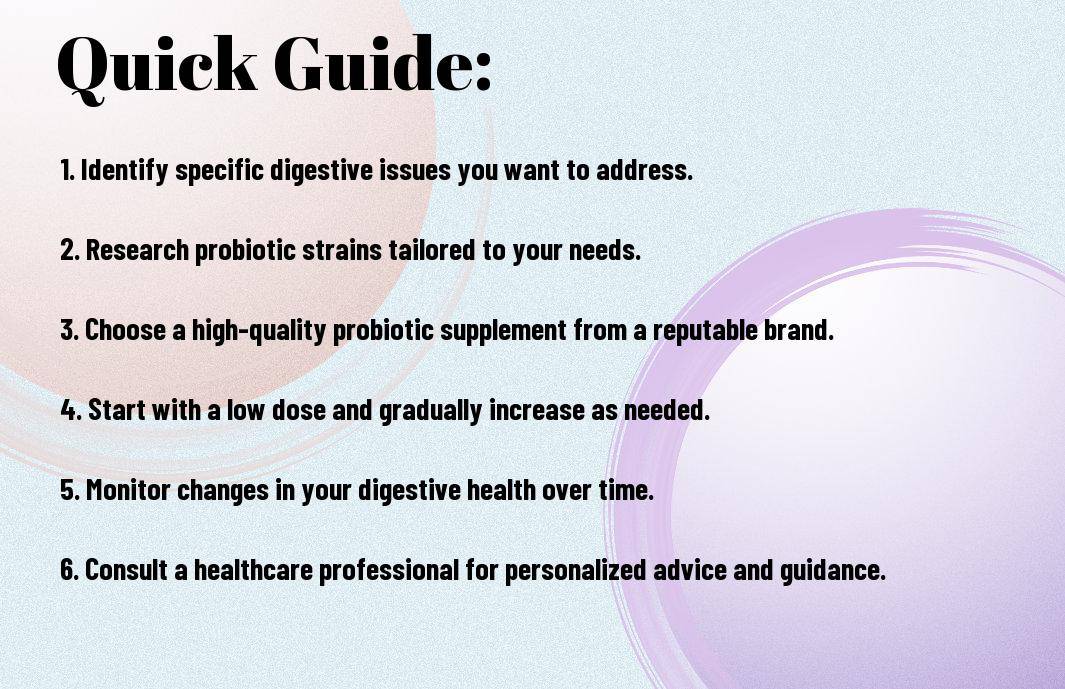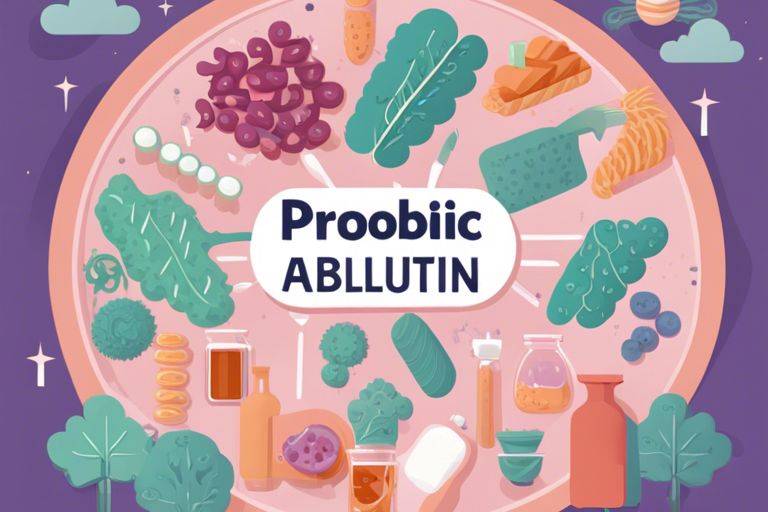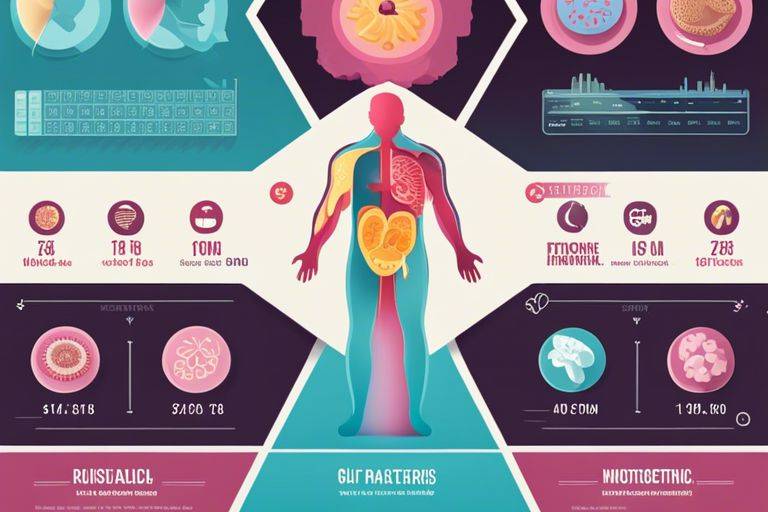There’s no need to suffer in silence when it comes to digestive issues. In this complete guide, I will share with you the probiotic solution that can help you achieve a happy gut and bid farewell to all your stomach woes. Say goodbye to bloating, gas, and indigestion as we examine the world of probiotics and how they can revolutionize your digestive health. Get ready to take control of your gut health and initiate on a journey towards optimal well-being!

Key Takeaways:
- Probiotics for digestive health: Probiotics can help restore the balance of good bacteria in your gut, which can alleviate digestive issues.
- Benefits of probiotics: Probiotics can boost your immune system, improve digestion, and reduce symptoms of bloating, gas, and diarrhea.
- Types of probiotics: There are different strains of probiotics that can target specific digestive issues, so it’s important to choose the right one for your needs.
- Probiotic-rich foods: Incorporating probiotic-rich foods like yogurt, kefir, sauerkraut, and kimchi into your diet can also help improve your gut health.
- Combining probiotics with prebiotics: Prebiotics are a type of fiber that feeds the good bacteria in your gut, so combining them with probiotics can enhance their effectiveness.
- Consult a healthcare professional: If you have persistent digestive issues, it’s important to consult a healthcare professional to determine the underlying cause and the best course of treatment.
- Consistency is key: It’s important to take probiotics consistently to see the benefits, as the effects may take time to manifest. Remember to follow the recommended dosage.


Understanding Digestive Issues
While Simple Ways to Manage Digestive Problems might provide some relief, it’s important to understand the underlying issues causing digestive problems.
Common Symptoms and Causes
Digestive issues are often characterized by symptoms such as bloating, diarrhea, constipation, gas, and abdominal pain. These symptoms can be caused by various factors including poor diet, stress, food intolerances, infections, and underlying medical conditions.
The Impact on Daily Life
If you suffer from digestive issues, the impact on your daily life can be significant. Managing your digestive problems can be challenging, affecting not only your physical health but also your mental well-being.
Understanding the root cause of your digestive issues is crucial in finding the right solution to improve your overall quality of life.

What are Probiotics?
Definition and Function
Now, let’s talk about probiotics. These are live microorganisms that provide health benefits when consumed in adequate amounts. Probiotics help restore the natural balance of gut bacteria, improving digestion, and supporting the immune system.
Types of Probiotics (Lactobacillus, Bifidobacterium, etc.)
For more specific information, there are different types of probiotics available, such as Lactobacillus and Bifidobacterium. These are the most common strains found in probiotic supplements and fermented foods. Assume that each type has unique properties and benefits your gut health differently.
| Lactobacillus | Bifidobacterium |
| Helps with diarrhea and lactose intolerance | Supports gut health and boosts the immune system |
| Reduces symptoms of irritable bowel syndrome | Alleviates constipation |
| Prevents urinary tract infections | Reduces inflammation |
| May help with eczema and allergies | May improve symptoms of depression and anxiety |
| May enhance oral health | May improve metabolism |
How Probiotics Work in the Gut
The probiotics work by adhering to the lining of the gut, creating a barrier against harmful bacteria, and producing compounds that inhibit their growth. They also help regulate the immune response and reduce inflammation in the gut.
Probiotics are beneficial bacteria that play a crucial role in maintaining a healthy gut environment. They can help improve digestion, boost immunity, and even impact your mental health. Incorporating probiotic-rich foods or supplements into your daily routine can have significant long-term benefits for your overall well-being.
Factors to Consider When Choosing a Probiotic
Not all probiotics are created equal, so it’s important to consider a few key factors when selecting the right one for you. Here are some important things to keep in mind:
- Strain Diversity and Potency: Little diversity in strains and low potency may not be as effective. Look for a probiotic with a variety of strains and high potency to ensure maximum benefits.
- Delivery Form (Capsules, Powders, Foods): Delivery forms vary, and each has its own benefits. Consider your preference and convenience when choosing between capsules, powders, or foods.
- Allergen Concerns and Interactions: Now, I will discuss any allergens you may have and how they could interact with the probiotic you choose.
Strain Diversity and Potency
Little diversity in strains and low potency may not be as effective. Look for a probiotic with a variety of strains and high potency to ensure maximum benefits.
Delivery Form (Capsules, Powders, Foods)
Delivery forms vary, and each has its own benefits. Consider your preference and convenience when choosing between capsules, powders, or foods. Capsules are convenient for daily use, powders can be easily mixed into drinks or foods, and foods like yogurt can provide probiotics naturally.
Allergen Concerns and Interactions
Now, allergens and interactions may play a role in the effectiveness of your chosen probiotic. Consider any allergens you may have and how they could interact with the probiotic you choose.
Step-by-Step Guide to Incorporating Probiotics
| Selecting the Right Probiotic for Your Needs | Dosage and Timing Recommendations |
| Right | Needs |
Selecting the Right Probiotic for Your Needs
Right probiotic selection is crucial for addressing specific digestive issues. Look for products containing a high number of live cultures, including various strains of bacteria like Lactobacillus and Bifidobacterium, which are beneficial for gut health and overall well-being.
Dosage and Timing Recommendations
Needs to find the right balance when it comes to the dosage and timing of probiotics. Start with a lower dosage and gradually increase it as your body adjusts. It’s often recommended to take probiotics with a meal to enhance effectiveness and minimize potential side effects.
Your gut health and individual needs will determine the ideal dosage and timing for you. Consult with a healthcare professional or a nutritionist to customize a probiotic regimen that fits your lifestyle and health goals.
Combining Probiotics with Other Gut-Friendly Habits
While adding probiotics to your routine can provide numerous benefits for your digestive system, enhancing their effects with other gut-friendly habits is key. Incorporating a balanced diet rich in fiber, staying hydrated, getting regular exercise, and managing stress levels can support the growth of probiotics and promote a healthy gut microbiome.
Tips for Maximizing Probiotic Benefits
All probiotic supplements are not created equal, so it’s important to choose one with a high amount of live bacteria cultures. Look for supplements that contain at least 10 billion CFUs (colony-forming units) per serving. Additionally, it’s crucial to store your probiotics properly to maintain their potency. I recommend keeping them in a cool, dry place away from direct sunlight.
Perceiving improvements from probiotics may take some time. While some people notice benefits within a few days, for others, it may take several weeks. Consistency is key, so make sure you take your probiotic supplement regularly as recommended. Keep track of any changes you experience in your digestive health to monitor progress.
Diet and Lifestyle Adjustments
On your journey to better digestive health with the help of probiotics, it’s important to support their efficacy with a balanced diet and healthy lifestyle choices. Incorporating fiber-rich foods, staying hydrated, and engaging in regular physical activity can further enhance the benefits of probiotics.
Managing Expectations and Side Effects
Adjustments may be needed as your body adapts to probiotic supplements. It’s common to experience mild digestive discomfort initially, such as gas or bloating. However, these symptoms usually subside as your body adjusts. If uncomfortable side effects persist, consult with a healthcare professional to determine the best course of action.
Long-Term Maintenance and Monitoring
Diet plays a crucial role in the long-term effectiveness of probiotics. By maintaining a healthy diet rich in fruits, vegetables, and other nutrient-dense foods, you can create an optimal environment for probiotic benefits to thrive. Regularly monitoring your digestive health and adjusting your routine as needed will help sustain the positive effects of probiotics over time.
Weighing the Pros and Cons of Probiotics
Despite the numerous benefits of probiotics, it’s crucial to weigh the pros and cons before incorporating them into your routine. Here is a breakdown of the advantages and disadvantages of using probiotics:
| Advantages | Disadvantages |
| Improved Digestion | Cost |
| Boosted Immunity | Potential Interactions |
Advantages (Improved Digestion, Boosted Immunity)
Pros: Incorporating probiotics into your diet can lead to improved digestion and a boosted immune system. These friendly bacteria help maintain a healthy gut flora, leading to better overall digestive health and stronger immunity. If you’re looking to enhance your gut health, probiotics can be a great addition to your routine. You can learn more about how to reset your gut in 3 days here.
Disadvantages (Cost, Potential Interactions)
Boosted: While probiotics offer significant benefits, it’s crucial to consider the potential disadvantages. Cost can be a factor as high-quality probiotic supplements or probiotic-rich foods may come with a price tag. Additionally, there is a risk of potential interactions with certain medications or medical conditions, so it’s crucial to consult with your healthcare provider before starting a probiotic regimen.
To conclude, although probiotics offer various advantages such as improved digestion and boosted immunity, it’s important to be aware of the potential downsides such as cost and potential interactions. Always consult with your healthcare provider to determine if probiotics are the right choice for you and to ensure their safe and effective use.
To wrap up
Taking this into account, I hope this Digestive Issues? Probiotic Solution! guide has been helpful in shedding light on probiotics and their potential to improve your gut health. By incorporating probiotic-rich foods or supplements into your daily routine, you may find relief from digestive issues and experience overall improved well-being. Remember to consult with a healthcare professional before making any significant changes to your diet or lifestyle!
FAQ
Q: What are digestive issues?
A: Digestive issues refer to a range of problems that can occur in the digestive system, such as bloating, gas, constipation, diarrhea, and stomach pain.
Q: What is a probiotic solution?
A: A probiotic solution is a supplement that contains live beneficial bacteria that can help improve gut health and digestion.
Q: How do probiotics help with digestive issues?
A: Probiotics help by restoring the balance of good bacteria in the gut, which can improve digestion, reduce inflammation, and strengthen the immune system.
Q: Are probiotics safe to use for digestive issues?
A: Generally, probiotics are safe for most people to use, but it’s always best to consult with a healthcare provider before starting any new supplement regimen.
Q: How long does it take to see results from taking probiotics for digestive issues?
A: Results can vary from person to person, but some individuals may start to notice improvements in their digestive issues within a few days to a few weeks of consistently taking probiotics.
Q: Can probiotics be taken with other medications?
A: It’s recommended to consult with a healthcare provider before taking probiotics with other medications to ensure there are no potential interactions.
Q: Are there any side effects of taking probiotics for digestive issues?
A: While most people do not experience any side effects from taking probiotics, some individuals may experience mild symptoms such as bloating or gas during the initial days of use.



